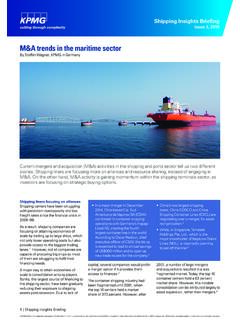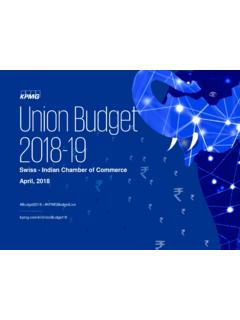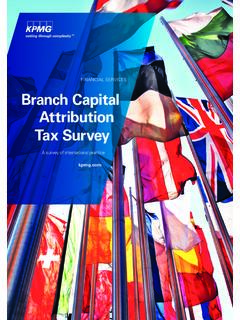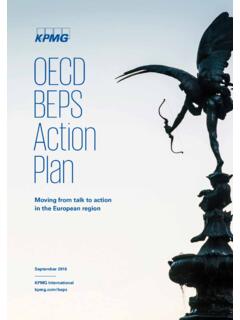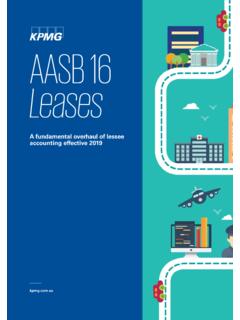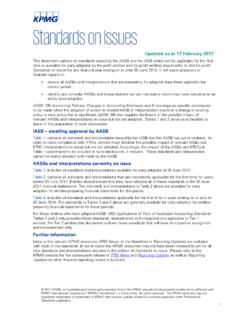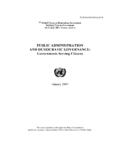Transcription of OECD BEPS Action Plan - KPMG
1 Taking the pulse in the Asia Pacific regionMay 2016 KPMG beps Action plan IntroductionTax executives of international companies headquartered in the Asia Pacific (ASPAC) region face ongoing uncertainty over international tax rules as the future of tax in the region continues to take shape. The Organisation for Economic Co-operation and Development s (OECD) original Action plan on Base Erosion and Profit Shifting ( beps )1 is complete, and the G20 endorsed the final beps deliverables released in October 2015. The OECD is now putting in place mechanisms to monitor the implementation of the beps minimum standards for items requiring universal implementation. At the same time, the OECD continues to engage in extensive follow-up work flowing from the 2015 the European Union (EU) appears to be taking the lead with its efforts to harmonize EU beps implementation, with significant impact on Asia Pacific headquartered companies with European operations.
2 Australia, China and India have made major contributions to the final content of the beps recommendations, and they are at the forefront of beps implementation. Many other Asia Pacific countries are influencing and being influenced by the profound international taxation changes that are underway. How is beps -related tax policy evolving in this diverse region? As we turn the corner from consultation to implementation, the time is right to take stock. This report is the third in our series of pulse checks on how actions on beps policy are progressing in the Asia Pacific region. For this report, we polled international tax leaders from KPMG s member firms across the region to get their views on trends and developments in the region. In particular, we asked: How are Asia Pacific governments responding to the OECD beps 2015 deliverables?
3 Which Asia Pacific governments are implementing or plan to implement the newly formulated international tax guidelines? What unilateral actions to combat beps and aggressive tax avoidance are Asia Pacific governments taking outside of the OECD beps process? What are the implications for international companies doing business in the region?Our findings are set out in the following pages, starting with an overview of beps -related trends in the region as a whole, followed by an in-depth look at how events are unfolding in selected Asia Pacific countries. We conclude with strategic advice that tax directors of all international companies should consider now to guard against adverse change and thrive in Asia Pacific s new tax reality. 1 G20 Organisation for Economic Co-operation and Development (2013), Action plan on Base Erosion and Profit Shifting, OECD Publishing.
4 (referred to herein as OECD beps Action plan ).Christopher XingAsia Pacific Regional Leader, International Tax and Head of International Tax for ChinaKPMG in China/Hong KongManal Corwin Head of US International Tax, and Head of Global beps Network KPMG in the USVinod Kalloe Head of International Tax Policy KPMG Meijburg & Co, The Netherlands 2016 KPMG International Cooperative ( KPMG International ). KPMG International provides no client services and is a Swiss entity with which the independent member firms of the KPMG network are beps Action plan : Taking the pulse in the Asia Pacific region 2016 Countries in focus: Moving from talk to actionBracing for beps : Are you ready?Appendix Unilateral beps legislative actions in the Asia Pacific regionAustralia ..10 China ..12 India ..16 Japan ..20 Korea.
5 22 Singapore ..2403082628 2016 KPMG International Cooperative ( KPMG International ). KPMG International provides no client services and is a Swiss entity with which the independent member firms of the KPMG network are beps Action plan : Taking the pulse in the Asia Pacific region 20162 2016 KPMG International Cooperative ( KPMG International ). KPMG International provides no client services and is a Swiss entity with which the independent member firms of the KPMG network are beps Action plan :Taking the pulse in the Asia Pacific region 2016 OECD beps Action plan : Taking the pulse in the Asia Pacific region 20163 2016 KPMG International Cooperative ( KPMG International ). KPMG International provides no client services and is a Swiss entity with which the independent member firms of the KPMG network are beps Action plan : Taking the pulse in the Asia Pacific region 2016 The OECD Action plan on beps , introduced in 2013, set 15 specific Action points to ensure international tax rules are fit for an increasingly globalized, digitized business world.
6 They also aim to prevent international companies from paying little or no tax. After 2 years of outstanding effort, on 5 October 2015, the OECD published guidance on domestic legislative and administrative changes to address all 15 of the plan s Action points and gained the G20 s approval on 16 November 2015. Most OECD and G20 countries have been engaged in the OECD s work, and many other countries in the Asia Pacific region and worldwide are either fully engaged or watching developments closely. Each government will have to determine how the guidance affects its existing rules, and then undertake the lengthy process of proposing, debating and enacting domestic tax changes. In some countries, years may pass before reforms become law. The OECD s goal is to achieve consensus on a coordinated implementation of uniform international taxation principles for the modern age.
7 While European and North American countries have been particularly vocal, a number of Asia Pacific countries have come to the fore and have exerted significant influence on the beps has taken a particularly active and constructive role in the various Working Party meetings that considered the Action plan items. Building on this record, China is the host of the G20 and the forum on Tax administration (FTA) meetings in 2016. In a February 2015 communiqu , the G20 finance ministers and central bank governors announced that China would establish an international tax policy research center to drive thinking on international tax policy design and deliver technical assistance to developing steps?Now that the Action plan guidance is complete, different countries are proceeding at somewhat different paces in implementing the beps proposals.
8 Businesses have raised concerns over the uncertainty and complexity that is bound to result from staggered implementation of new rules among different countries. The OECD is currently drawing up terms of reference for a peer review system to monitor the implementation of the minimum standards agreed under beps . Going forward, the OECD will continue to develop guidance for implementing the beps changes, with ongoing work in 2016 to address, among other things, profit attribution for permanent establishments and guidance on the use of transfer pricing profit splits. Which countries are on board?In their engagement with the OECD beps Action plan , countries in the Asia Pacific region fall on a spectrum that runs from 100 percent participation and commitment to non-engagement. At one extreme, the OECD members in the region are highly engaged and likely to adopt the full slate of beps proposals in accordance with the OECD guidelines.
9 Australia has perhaps been most involved to date given its role as president of the G20 during 2014 and its desire to see real progress on beps during its tenure. With Source: KPMG International, 2016.* OECD member and accession G20 non-OECD Action plan observer status Developing country invitee to Action plan from Nov 2014 Spectrum of engagement: Asia Pacific jurisdictionsBruneiCambodiaLaosMacauMyan marPapua New GuineaSri LankaFijiMongoliaVietnamHong Kong SARM alaysia PakistanPhilippines Singapore TaiwanThailandIndia Indonesia Australia* (G20 host 2014) China (G20 host 2016)Japan* Korea* New Zealand*No engagementon BEPSG enerally followinternational tax trends restrainedby domesticcapabilitiesPartialinvolvement andinterest mayadopt somemeasuresInvolvementand interest voluntaryadoption ofmany guidelines100 percentsubstantial involvement and likely adoptionOECD beps Action plan : Taking the pulse in the Asia Pacific region 20164 2016 KPMG International Cooperative ( KPMG International ).
10 KPMG International provides no client services and is a Swiss entity with which the independent member firms of the KPMG network are Japanese Ministry of Finance official currently in place as chair of the OECD Committee on Fiscal Affairs, Japan is also highly invested in the Action plan s successful the other end of the spectrum, many of the region s developing countries show little interest in the OECD s project. With modest levels of foreign direct investment, low international activity and less developed taxation systems, these countries do not perceive beps to be a significant problem. Further, many of these countries are members of the Association of Southeast Asian Nations (ASEAN), and their tax reforms have been driven by other priorities, including creation of the ASEAN Economic Community in 2015 (discussed below).




